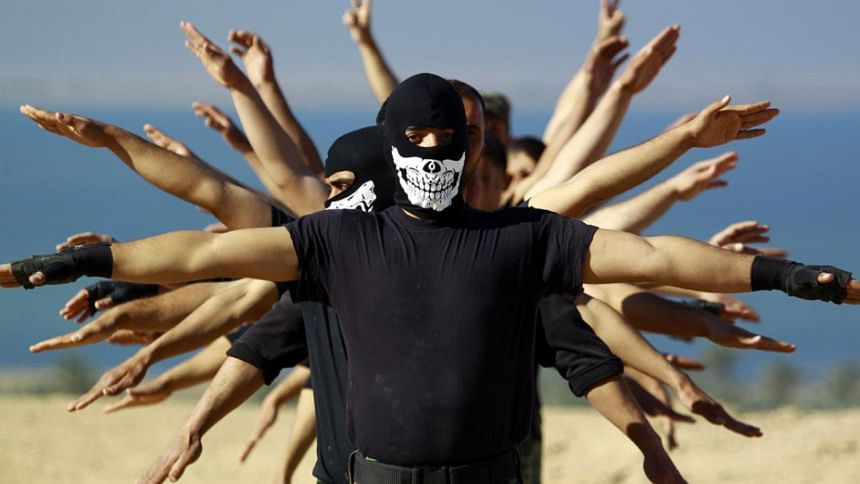Unlike any that came before

Evidence emerged in 2014 that the IS' success in the battlefield had a lot to do with the disenfranchised Ba'ath party members of Iraq. We were confronted by a "marriage of convenience" between hard-line Islamists and former members of deposed Saddam Hussein's army of Iraq. Indeed, two top deputies of IS' self-proclaimed Caliph, Abu Bakr al Baghdadi, are former Iraqi Ba'athists. Abu Muslim al Afari al Turkmani, suspected to be a former senior Special Forces officer and a member of military intelligence in Saddam Hussein's army, was subsequently killed in May, 2015 in a bombing. Abu Ali al Anbari, another former Ba'athist, plays a more political role overseeing the local councils and political envoy of IS.
The IS has benefited greatly from its association with Iraqi Ba'athists who brought with them military and political expertise. In fact, without their direct participation, it is highly suspect whether the militant group could have pulled off operations like the capture of Nineveh Province and its capital, Mosul in 2014. They say, war makes strange bedfellows; for former henchmen of Saddam Hussein, the continued existence of IS provides an opportunity to return Sunni rule to Iraq sometime in the future; for IS, the continued association means more territorial gains or the opportunity to hold on to territory already gained and selling the dream of a living, breathing "Caliphate", a citadel of hope for disillusioned Muslims globally, to congregate and fight for their version of holy war.
What has emerged of IS' top leadership from investigative journalism is that almost all are of Iraqi origin, who, at one time or other, served in the military and security apparatus of Saddam's Iraq. Yet, there have been rifts between Ba'athists and the core IS leadership. To what extent these will manifest themselves in the near term is, of course, open to interpretation. While Ba'athists largely believe in a secular state, IS believes in the "caliphate", an Islamic Order based on an extreme version of Salafist thought that essentially states that anyone or any group opposed to its rule is either an apostate (murtad) or an infidel (kafir). Whether that rift will create deep divisions in the order is perhaps an argument best left for the future.
IS has transformed itself from a mere terrorist organisation to one that can broadly be classified as an insurgent movement. It holds large parts of Syria and Iraq. Militarily, it has undergone metamorphosis from secret cell-based hit teams to military divisions that have changed the hit-and-run tactics to campaigns conducted to conquer and hold territory. IS continues to attract thousands of new followers. Iran's ever-expanding sphere of influence and the establishment of Shiite rule in Iraq, the ousting of minority-Sunni led government after the US-led invasion, disenfranchisement of the Iraqi Sunni minority from positions of influence are all contributing factors to IS's success.
Today we are confronted with attacks made either by IS (or in its name) from Beirut to Paris. We are faced with a group that has successfully recruited fighters from Belgium to Chechnya. It has managed to strike at the heart of Europe, where the backlash against Syrian refugees will do little to stem the tide of violence which shows no signs of abating even as the IS core is increasingly under threat from a US-led coalition on the one hand, and a Russian and Iranian-backed Syrian army acting in collusion with Shiite militias on the other. The group is a multinational outfit, drawing an estimated half of the 15,000 foreign fighters ( as of 2014 ) from five countries, Tunisia, Saudi Arabia, Morocco, Jordan and Turkey; the rest have come from all over the place including Europe.
Looking beyond military capabilities, the IS has invested heavily in trying to gain legitimacy through endorsement of religious scholars which give it mileage as a serious alternative religious base. As per a report published by the New York-based intelligence firm in November, 2014, The Soufan Group, Islamic State "is reported to have recruited a Saudi officer… to enlist respected preachers on its behalf. This effort led to the Islamic State appointing three principal Sharia leaders, Omar al Qahtani, a Saudi national who changed his name from Abu Hafs to Abu Bakr in homage to his leader; Turkī al-Bin'alī, also known as Turki bin Mubarak bin Abdullah, Abu Dergham, and Abul Humam Bakr Bin Abdul Aziz al Athari, who is based in Bahrain having been expelled from his United Arab Emirates for his Salafist/Takfiri preaching; and thirdly Osman al Nazeh al Asiri, a Saudi national who went to fight in Syria in early 2013 and was prominent in arguing the case for The Islamic State in its dispute with Jabhat al Nsura. Bandar bin Sha'alan has also recruited donors and coordinated the recruitment of fighters. He now plays an important role in the media efforts."
IS has successfully demonstrated that it is capable of organising attacks far from its "shores", it has added large swathes of territory that it has held for years and is in the process of gaining the competence of "governing" these territories. The fight against this outfit is not only a military one; it is also an ideological one. Until we take that into cognizance, the "caliphate" will continue to exist in one form and another and radicalisation of disillusioned youth cannot truly be checked.
The writer is Assistant Editor, The Daily Star.

 For all latest news, follow The Daily Star's Google News channel.
For all latest news, follow The Daily Star's Google News channel. 



Comments